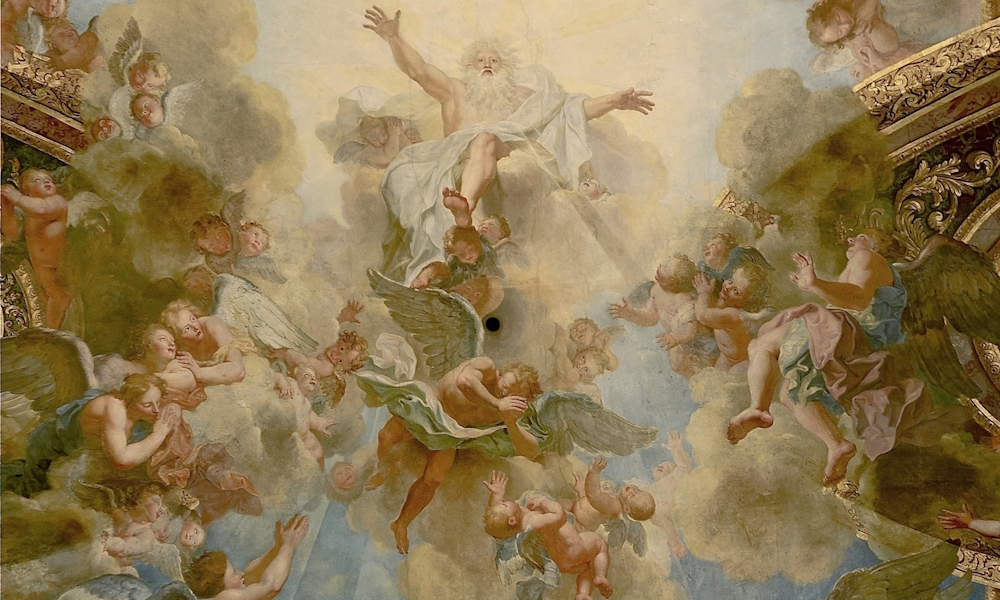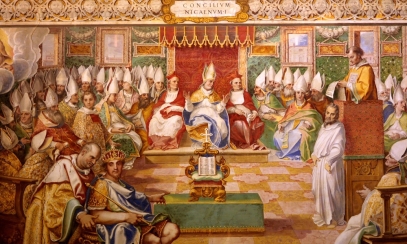
The Nicene Creed
Part Two
Part Two
The last issue of the One Voice published a broad overview of the Nicene Creed’s background. With that groundwork laid, in this issue, we will delve into the opening words, taking a deeper look at the meaning behind what we profess.
The last issue of the One Voice published a broad overview of the Nicene Creed’s background. With that groundwork laid, in this issue, we will delve into the opening words, taking a deeper look at the meaning behind what we profess.
“I believe in one God”
It may seem strange to us as Christians here in the 21st century to even say that there would have to be a statement of there being only one God, but for the Christians of the fourth century it was not strange at all. We must remember that early Christians were surrounded by pagans who openly worshiped multiple gods. In fact, Constantine, emperor of the Roman Empire at that time, is said to have ultimately converted to Christianity from paganism himself, proving it was a prominent belief structure in the early years of the Church. St. Paul, in his missionary journeys (44-58 A.D.) ran into this all the time. A great example is when he was in Athens and discovered multiple shrines to gods, even one inscribed “To an Unknown God,” which he proclaimed to the pagan Athenians was the true God. (Homework! Read Acts 17:22-32)
Our belief in one God (monotheism) is central to our faith. We believe in one God in three persons: Father, Son, and Holy Spirit. We do not believe in three Gods. Jesus said that God is “the one Lord,” but at the same time, He said He Himself is “the Lord,” indicating His participation in the Trinity.[i] In addition, believing in the Holy Spirit as “Lord and giver of life” does not diminish our understanding of the one God either.
Here is how the bishops of the fourth Lateran Council in 1215 put it: “We firmly believe and confess without reservation that there is only one true God, eternal, infinite and unchangeable, incomprehensible, almighty, and ineffable. The Father and the Son and the Holy Spirit; three persons indeed, but one essence, substance, or nature entirely simple.”[ii]
Even though it seems obvious to us that we would profess our belief in one God, it is important for us to recognize that we are professing to believe in the ONE true God, the God of the Abrahamic faith tradition. God Himself revealed this to Israel: “Hear, O Israel! The Lord is our God, the Lord alone! Therefore, you shall love the Lord, your God, with all your heart, and with all your soul, and with all your strength.” (Dt 6: 4-9) Jesus cited the same words as being “the greatest and the first commandment.” (Homework! Read Mk 12:28-30)
“The Father, Almighty …”
Of all the divine attributes, only God’s omnipotence is named in the creed. Our God is the Father, the Almighty, to us. He reveals His omnipotence by the way He takes care of our needs, just as a father does his children. (Homework! Read Mt 6:25-34) Jesus used “Father” for God, so we can’t go wrong using the same terminology! In fact, Jesus would sometimes refer to Abba Father, a term showing great intimacy, such as our term “daddy” today.
The Catechism of the Catholic Church says, “By calling God ‘Father,’ the language of faith indicates two main things: that God is the first origin of everything … and that He is at the same time goodness and loving care for all His children. God’s parental tenderness can also be expressed by the image of motherhood, which emphasizes God’s immanence, the intimacy between Creator and creature. … God transcends the human distinction between the sexes. He is neither man nor woman: He is God. He also transcends human fatherhood and motherhood, although He is their origin and standard: no one is father as God is Father.[iii]
He is the Almighty. We believe that God’s might is universal, for God Who created everything also rules everything and can do everything. His creative power is unlimited. God’s creative power is independent of all pre-existing matter. He produced things out of nothing! All that God created is good. Having this statement of God’s power in the creed ended a debate among some theologians of the time who claimed that everything in the material world was evil and to be despised.
“Only faith can embrace the mysterious ways of God’s almighty power. … Nothing is more apt to confirm our faith and hope than holding it fixed in our minds that nothing is impossible with God. Once our reason has grasped the idea of God’s almighty power, it will easily and without any hesitation admit everything that [the creed] will afterwards propose for us to believe — even if they be great and marvelous things, far above the ordinary laws of nature.”[iv] These words, taken from the Catechism of the Catholic Church, tell us that true faith brings us to understanding and belief. As you prepare yourself to recite the creed, first take the time before Mass to look into your heart and examine your faith. If you find it lacking in any way, ask God to increase it, just as the disciples asked Jesus for His help in increasing theirs. (Homework! Read Lk 17:5)
In the next issue, we will look at the words: “… maker of Heaven and earth, of all things visible and invisible.”
[i] Mark 12:35-37
[ii] Lateran Council IV: DS 800
[iii] Catechism of the Catholic Church, 239
[iv] United States Catholic Conference, Inc. – Libreria Editrice Vaticana. Catechism of the Catholic Church Washington, DC: United States Catholic Conference, Inc., 1994. 273, 274
Deacon Robert Long serves Our Lady of the Valley Catholic Parish in Birmingham. He was ordained to the permanent diaconate on Dec. 7, 2013, by Bishop Emeritus Robert Baker at the Cathedral of St. Paul. Excerpts from Deacon Long’s series on the Nicene Creed will be published in issues of the One Voice through the end of 2026. This article comprises the second installment of his 8-part series.


